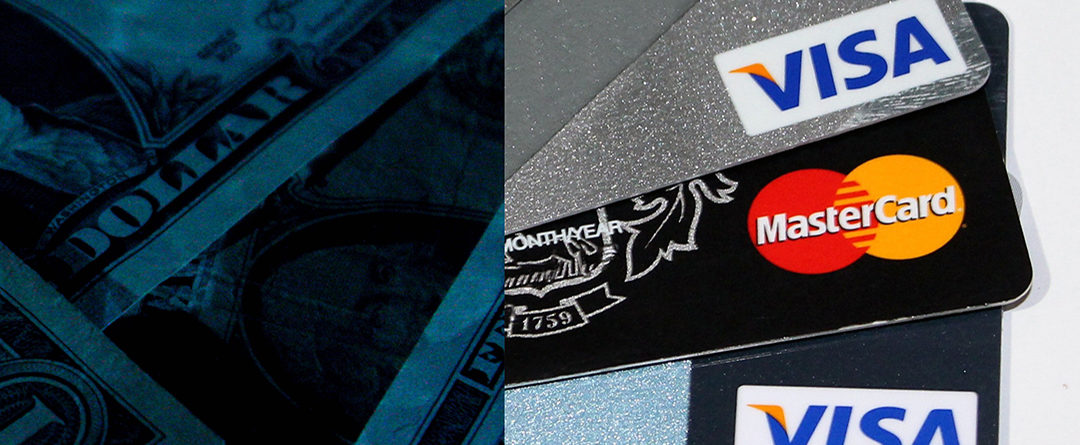by Clare La Plante
I have worked on and off for years as a financial journalist. And I learned as I wrote. In fact, writing about one hot-button topic — credit card debt — helped me to avoid that particular financial heartbreak. I waited until I was about 30 to get my first credit card, and I treated it warily, as though it were a wild animal. If I played with it too long or too carelessly, it might turn on me and attack.
I knew from my work that Americans carry on average about $5,700 of credit card debt. Paying off that debt with just minimum payments would take 30 years, with about $15,000 in interest. I also learned that we usually spend 112 percent more when we buy something with a credit card.
Yet even knowing the downfalls of credit cards, I still feel a rush of pleasure when I can get what I want just by handing over a piece of plastic. I feel immune, momentarily, from financial constraints and any other consequences, some overt, others more subtle.
Credit’s seduction: money buys everything
 We have become easy prey to some savvy sellers. I’m as guilty as the next woman of scanning whatever magazines I can get my hands on — in the grocery line, at home when bored, or on trains and airplanes. These magazines contain images that I think don’t harm me, but they quietly instill a desire to look glamorous, thin, and exquisite. I start to feel a small seed of anxiety that tells me I need to buy the things that will allow me to do so.
We have become easy prey to some savvy sellers. I’m as guilty as the next woman of scanning whatever magazines I can get my hands on — in the grocery line, at home when bored, or on trains and airplanes. These magazines contain images that I think don’t harm me, but they quietly instill a desire to look glamorous, thin, and exquisite. I start to feel a small seed of anxiety that tells me I need to buy the things that will allow me to do so.
I imagine in 50 years credit cards will be like cigarettes were 50 years ago, when doctors were prescribing them for stress. Now we know their immense dangers. Credit card companies give their wares out like candy — multicolored! So pretty! So fun! So easy. You can’t afford what you want? Don’t worry.
But things costs more than money
Enter debt. I think that each debt should contain within itself the means to repay it, either monetarily or in spirit and gratitude. When anyone lends us anything, then charges us more interest than we can afford, it’s usury, and usury drains the soul instead of replenishing its account. It also costs us our confidence that we can meet the next emergency, or the next debt that we cannot avoid: a medical crisis, a leaky roof, or a broken-down car. Or that new baby — they cost money, too.
And with every debt we carry ourselves, we become more inured to other debts: the debt of our country, the callous debt of strip-mall stores that offer “easy” credit at ruinous rates to the poor and the debt of honor we owe our forefathers and mothers who escaped from lands where they were unfree. Instead, we become chained to our wallets and expensive handbags.
Avoid stealing from your soul
I think that addressing credit card debt requires a spiritual conversion. Often we get into debt when we’re afraid — afraid of loneliness, boredom, grief. Once, after a break-up, I overspent on massages and food to the point of needing to borrow money to pay the rent. We’re up against a serious pull — immediate gratification of deep hurts — in the credit card world. It’s a lot for a soul to resist. I know that in my brief forays into credit card debt I felt as though I was jumping off the high dive straight into anxiety. The bill would come, but I wished it wouldn’t and somehow I thought that life would protect me, sort of like Prince Charming.
I think the spiritual life means basically being present to each moment. The moment will tell you what to do. On the other hand, debt won’t. Or, rather it will, but it will tell you to worry, or spend more, or lie, cheat, or steal from yourself and your retirement, house, or vacation stash. You feel enslaved, which is a terrible thing for an independent woman to feel. Debt intrudes on our lives and steals something far greater than pennies a day. It steals a bit of your soul and the sacred space that allows us to be self-sufficient, with the Lord, the saints, and all of God’s bounty.
Getting free
 Find one spiritual practice that puts you on the road to recovery — prayer, meditation, walking, writing, singing. Make it something free, make it something beautiful, make it something your own. Pay off that debt, one penny by one penny, and watch yourself bloom. Save your credit cards for emergencies, when they can be useful, and throw off your burden.
Find one spiritual practice that puts you on the road to recovery — prayer, meditation, walking, writing, singing. Make it something free, make it something beautiful, make it something your own. Pay off that debt, one penny by one penny, and watch yourself bloom. Save your credit cards for emergencies, when they can be useful, and throw off your burden.
Pay yourself first. Through prayer and meditation and friends, and cool glasses of water when it’s hot, and walks when it’s cool, and rest when you’re sleepy, and fresh eyes when you’re weary. Pray more. Consider each day a gift that you cannot pay enough interest on. Don’t be afraid. Be like the lilies of the field.
Pay cash. Buy only what you can afford at that moment. Perhaps each purchase can be a silent prayer of intention and gratitude, a promise to self and to the vendor that this is a relationship that furthers our own growth. In fact, use the whole process as a metaphor — we should only ever use what we have available at the moment, whether it’s time, energy, or money.
Ultimately, debt doesn’t serve us, and it makes us forget how free we really are. The other day my husband and I took our infant son to several worrisome doctor visits. We had time to spare between appointments and went to a small diner on a nondescript road between car shops and chain sandwich stores. Inside this small restaurant, a Greek woman and a 10-year-old girl were serving two men at the counter.
The woman — the owner — didn’t accept anything but cash, she told us as we went to sit down. She’d had bad experiences with checks, she said, and credit cards were too much trouble. My husband and I had about ten bucks between us, but decided to stay.
The owner came over to take our order and looked at my son. “He is OK, he is strong,” she said, apropos of nothing. The food was good. We didn’t have everything we wanted, but we had everything we needed.
Clare La Plante is co-author of two books on the saints: Heaven Help Us: The Worrier’s Guide to the Patron Saints and Dear Saint Anne, Send Me a Man: And Other Time-tested Prayers for Love. She lives near Chicago with her husband and son.
Get financial advice from Consumer Credit Counseling.
Use this calculator to determine how long it will take to pay off your credit card debt.
Find out when you can receive a free credit report.
This article first appeared in the 2005 issue of Boldcafe.


THANK YOU SO VERY MUCH!! I strongly encourage our YOUNG adults to take this message seriously. At 82 and on a fixed income I am struggling to payoff credit card debt. Have prayed long and hard to be released from the “had to buy in case I WOULD NEED it” attitude.